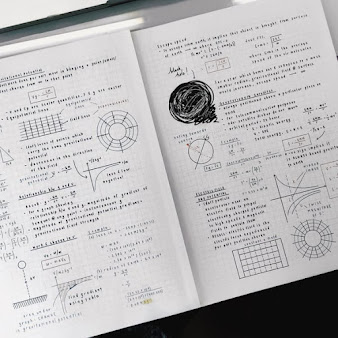In short - use your time wisely and
don't blindly follow what other students think is the "perfect study
method" (whatever that is).
You
can use your time wisely by establishing a few study habits that will bring you
positive results throughout the academic year.
Study
habits can look something like this.
1.
Commit to achieving one (yes, ONE!) study goal per day.
Let's say your goal is to study for
a total of 8 hours in one day. How will you know what is most important to do?
The best way to focus your mind on what's important is to start your day by
asking, “What is ONE thing I'm committed to accomplishing today? There are many
benefits to asking a question. It will encourage you to think strategically
about the day and keep you focused on your main study goal. This doesn't mean
you shouldn't have many study goals, but it does mean you can complete one
(such as reading a certain number of chapters or practicing exam questions)
today.
It's easy. Write the question in
big letters on a piece of paper and hang it on the wall in your bedroom or
bathroom so you can easily see it when you wake up. Read it out loud when you
start your day. Think of an answer and say it out loud. During the day, make
sure you work towards completing your main study goal.
2.
Prioritize the most demanding cognitive tasks.
Students often leave their hard
work for the night, thinking they'll get an all-nighter and study more. Well,
one thing is for sure – timing is everything! But instead of putting off the
hard work, do it first thing in the morning. When you do this, you tap into
your circadian rhythm—your biological clock that determines which activities
you do best at certain times of the day.
You maximize peak performance. For
most people, your brain reaches peak performance 2-4 hours after waking up.
This is the time when your brain can focus on analytical thinking that requires
the most concentration, such as reading, writing, critical thinking, or problem-solving.
You will know the exact working
hours. If you wake up at 6, your peaks are between 8 and 10. And just because
it's noon doesn't mean you have to stop; extend this time by an extra hour to
maximize your peak performance and wrap up an important section, chapter or
lecture.
You will help your brain. If you do
your hard work early, your brain will be fully focused on the cognitive task
and you'll get more of the energy you've built up from your 7-8 hours of sleep.
This is much better than leaving your study session for the night when you are
mentally exhausted.
3.
Break up your day into shorter study periods.
Instead of dreading having to sit
at your desk for hours, use a timer. This way you allow your brain to focus in
a more targeted and effective way. Here are some examples.
Review study material. Set the
timer for 50-minute increments to maximize concentration, followed by a
10-minute break. For really short bursts of study, try the Pomodoro technique,
which consists of 25-minute blocks of time followed by 5-minute breaks.
Exam
questions. Use review questions from the textbook or create your own questions
based on the most important concepts from each chapter. Write the questions on
a sheet of paper. Then use the Pomodoro technique to practice for the exam.
Give yourself only a short time to answer each question. Take frequent breaks.
When you're done with one measured section, do something unrelated to your
work: get some fresh air, stretch, take a walk, have a snack, or have a cup of
coffee or tea.
4.
Write notes to summarize key concepts and ideas.
Sitting at a desk doesn't mean you
have to passively read a textbook. Taking notes while you read improves your
brain's cognitive abilities, making it easier to retain information and
improve your memory.
Write what is relevant. This
includes key concepts, ideas, and themes. Don't waste time writing every word of
the lecture. Instead, expand your critical thinking skills by determining what
is relevant to the topic at hand.
Organize information into an overview
or list. This saves time, allows you to browse the material when you need it,
helps you find information faster, and makes the review process easier.
Use colors. This applies to
multi-colored pens, markers, or highlighters to visually highlight the most
important parts. Use one color to highlight the highest priority concepts and
use other colors to identify second priority level items such as examples.
5.
Take a physical break from work to boost your memory.
Have you ever heard of the
Zeigarnik effect? It's a concept in psychology that explains that we remember
unfinished or interrupted tasks better than those we've already completed. The
brain prefers a certain tension. When we start a task and then interrupt it
with a break, a task-specific tension is created that can improve cognitive
function. The tension we feel from having to continue working later keeps the
task at the forefront of the mind; the brain is still focused on it and can
easily access the information it needs.
You can use these breaks to your advantage. When you take breaks between deep work sessions, choose activities that are not work-related—read a few pages of a book, do a little exercise, run an errand, clean your room, prepare lunch or a snack, or turn on some music that puts you in some good mood moods.
By: Muskan Shafiq
The writer is a pro-active teacher at Zanth Academy Jusak
Turbat Kech



0 Comments
Post a Comment